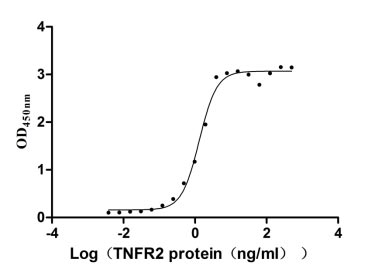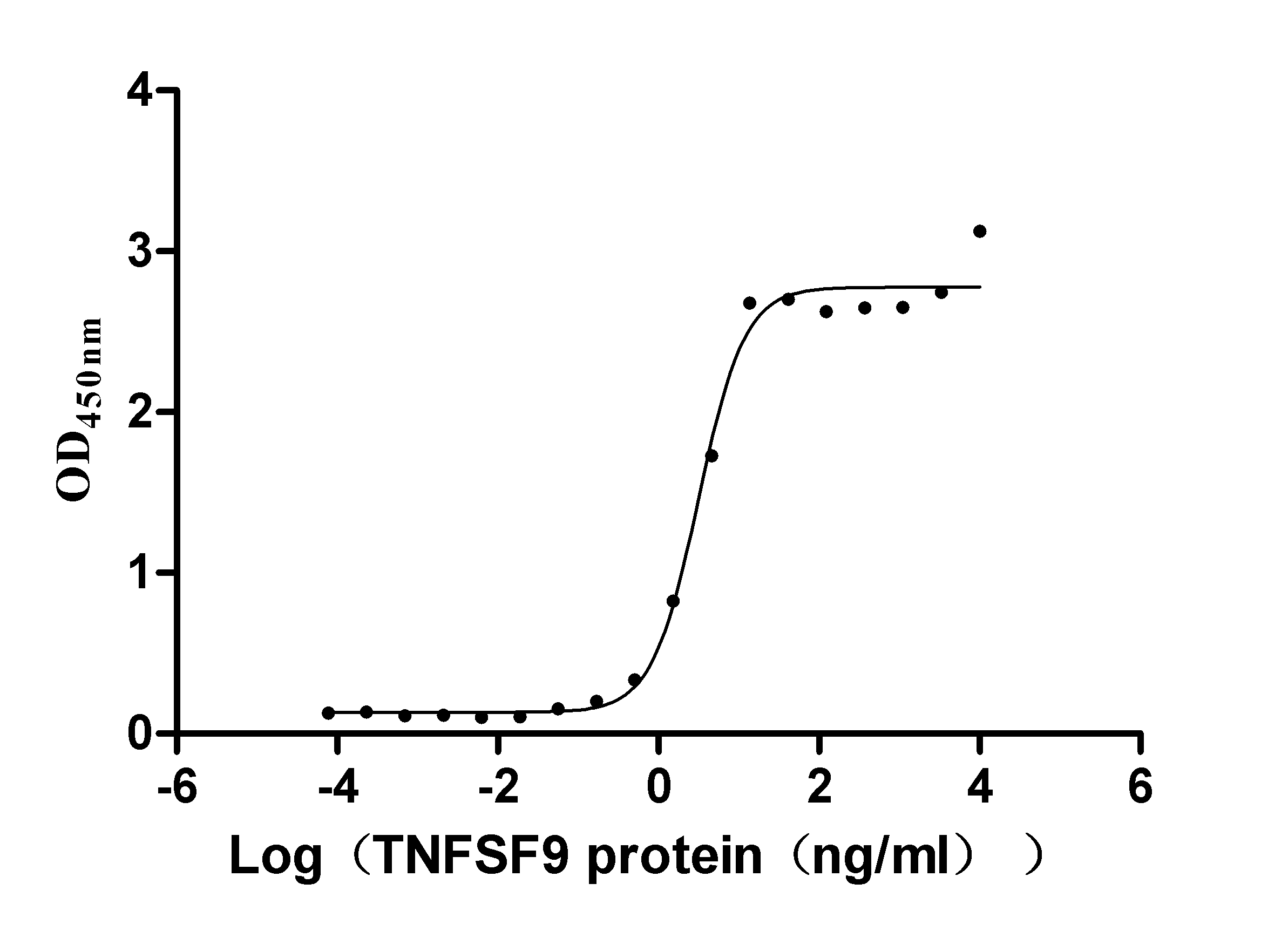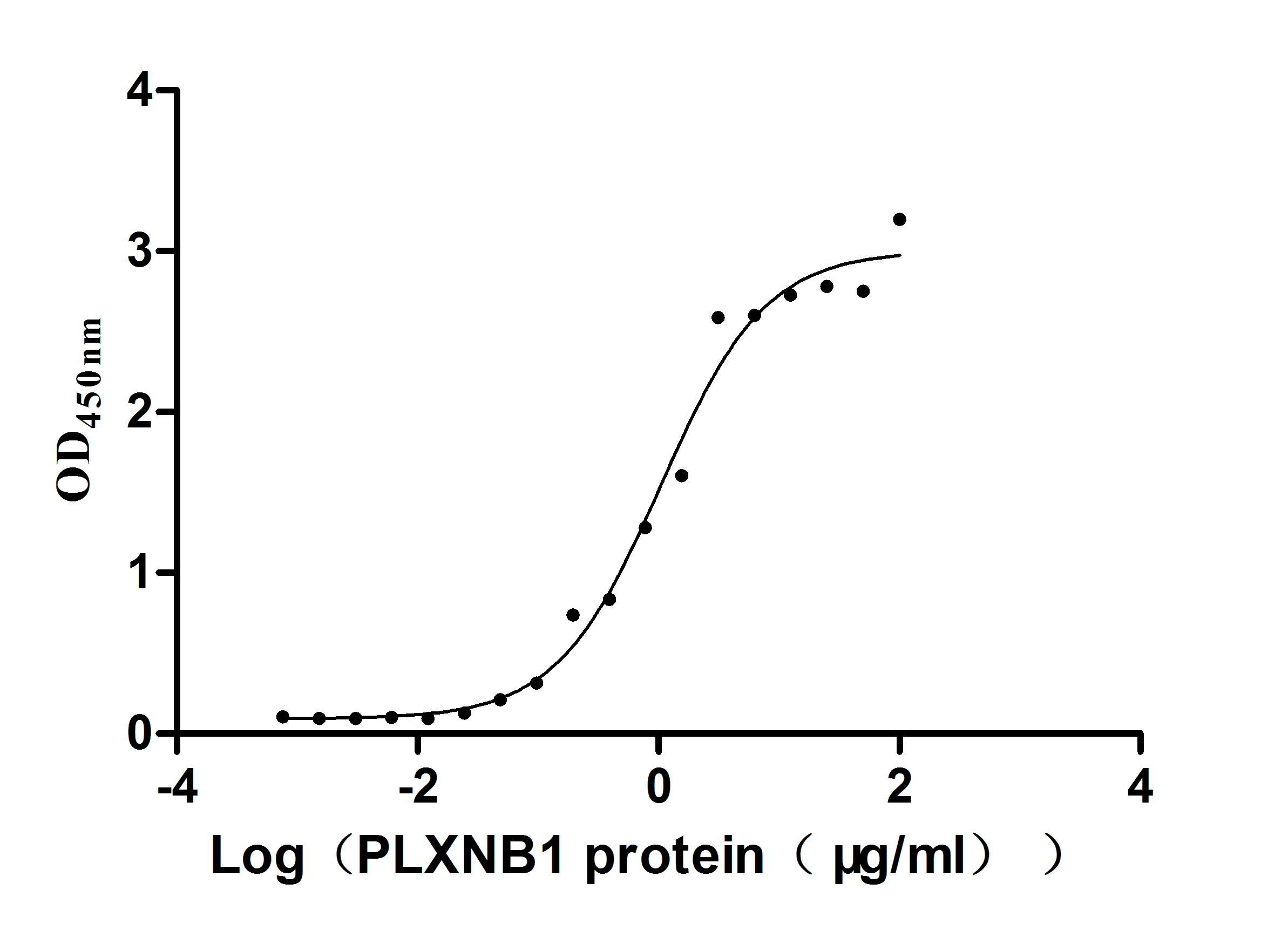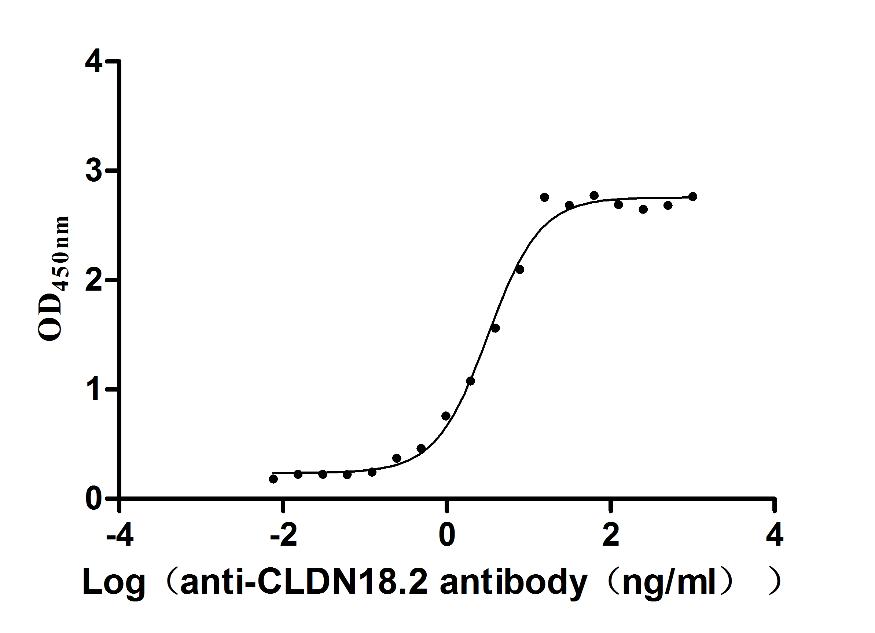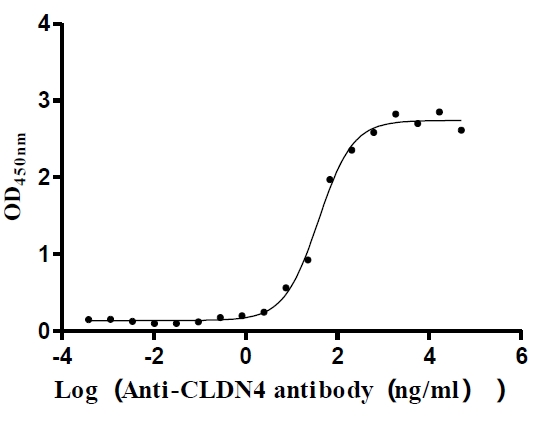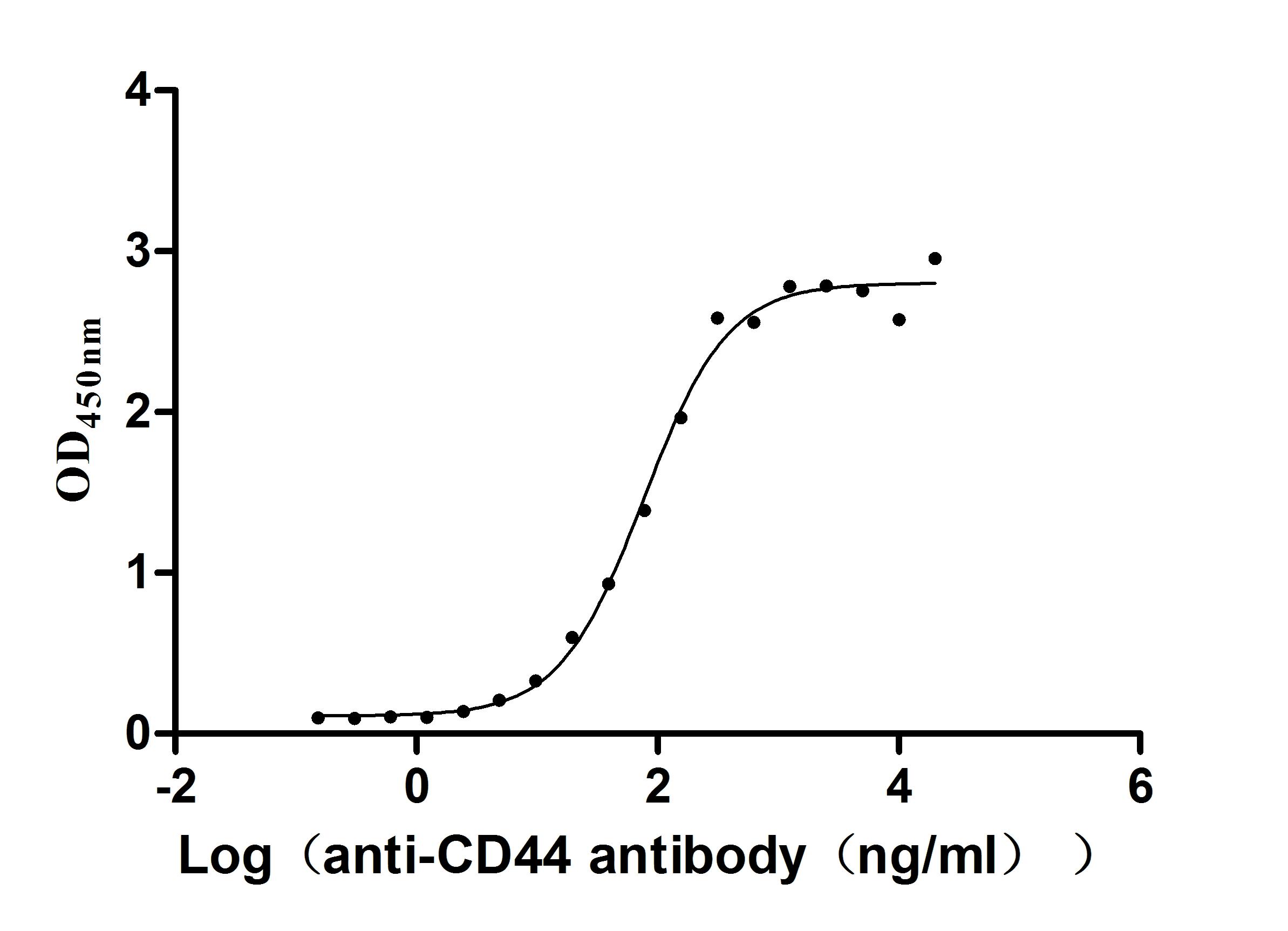Recombinant Human Plastin-2 (LCP1)
-
货号:CSB-MP012824HU
-
规格:
-
来源:Mammalian cell
-
其他:
-
货号:CSB-EP012824HU-B
-
规格:
-
来源:E.coli
-
共轭:Avi-tag Biotinylated
E. coli biotin ligase (BirA) is highly specific in covalently attaching biotin to the 15 amino acid AviTag peptide. This recombinant protein was biotinylated in vivo by AviTag-BirA technology, which method is BriA catalyzes amide linkage between the biotin and the specific lysine of the AviTag.
-
其他:
产品详情
-
纯度:Greater than 85% as determined by SDS-PAGE.
-
基因名:LCP1
-
Uniprot No.:
-
别名:CP64; L plastin; L-plastin; Larval cuticle protein 1; LC64P; LCP-1; LCP1; LPL; Lplastin; Lymphocyte cytosolic protein 1; Plastin 2; Plastin-2; PLS2; PLSL_HUMAN
-
种属:Homo sapiens (Human)
-
蛋白长度:Full Length of Mature Protein
-
表达区域:2-627aa
-
氨基酸序列ARGSVSDEEMMELREAFAKVDTDGNGYISFNELNDLFKAACLPLPGYRVREITENLMATGDLDQDGRISFDEFIKIFHGLKSTDVAKTFRKAINKKEGICAIGGTSEQSSVGTQHSYSEEEKYAFVNWINKALENDPDCRHVIPMNPNTNDLFNAVGDGIVLCKMINLSVPDTIDERTINKKKLTPFTIQENLNLALNSASAIGCHVVNIGAEDLKEGKPYLVLGLLWQVIKIGLFADIELSRNEALIALLREGESLEDLMKLSPEELLLRWANYHLENAGCNKIGNFSTDIKDSKAYYHLLEQVAPKGDEEGVPAVVIDMSGLREKDDIQRAECMLQQAERLGCRQFVTATDVVRGNPKLNLFIANLFNRYPALHKPENQDIDWGALEGETREERTFRNWMNSLGVNPRVNHLYSDLSDALVIFQLYEKIKVPVDWNRVNKPPYPKLGGNMKKLENCNYAVELGKNQAKFSLVGIGGQDLNEGNRTLTLALIWQLMRRYTLNILEEIGGGQKVNDDIIVNWVNETLREAKKSSSISSFKDPKISTSLPVLDLIDAIQPGSINYDLLKTENLNDDEKLNNAKYAISMARKIGARVYALPEDLVEVNPKMVMTVFACLMGKGMKRV
-
蛋白标签:Tag type will be determined during the manufacturing process.
The tag type will be determined during production process. If you have specified tag type, please tell us and we will develop the specified tag preferentially. -
产品提供形式:Lyophilized powder
Note: We will preferentially ship the format that we have in stock, however, if you have any special requirement for the format, please remark your requirement when placing the order, we will prepare according to your demand. -
复溶:We recommend that this vial be briefly centrifuged prior to opening to bring the contents to the bottom. Please reconstitute protein in deionized sterile water to a concentration of 0.1-1.0 mg/mL.We recommend to add 5-50% of glycerol (final concentration) and aliquot for long-term storage at -20℃/-80℃. Our default final concentration of glycerol is 50%. Customers could use it as reference.
-
储存条件:Store at -20°C/-80°C upon receipt, aliquoting is necessary for mutiple use. Avoid repeated freeze-thaw cycles.
-
保质期:The shelf life is related to many factors, storage state, buffer ingredients, storage temperature and the stability of the protein itself.
Generally, the shelf life of liquid form is 6 months at -20°C/-80°C. The shelf life of lyophilized form is 12 months at -20°C/-80°C. -
货期:Delivery time may differ from different purchasing way or location, please kindly consult your local distributors for specific delivery time.Note: All of our proteins are default shipped with normal blue ice packs, if you request to ship with dry ice, please communicate with us in advance and extra fees will be charged.
-
注意事项:Repeated freezing and thawing is not recommended. Store working aliquots at 4°C for up to one week.
-
Datasheet :Please contact us to get it.
相关产品
靶点详情
-
功能:Actin-binding protein. Plays a role in the activation of T-cells in response to costimulation through TCR/CD3 and CD2 or CD28. Modulates the cell surface expression of IL2RA/CD25 and CD69.
-
基因功能参考文献:
- LCP1-positive oral squamous cell carcnome samples were correlated closely with the primary tumor size and regional lymph node metastasis. PMID: 28230172
- MOLP8/R cells display a very high overexpression of LCP1 gene (l-Plastin) controlled by HIF1&alpha. PMID: 29882856
- these findings support a plausible mechanism by which the AP4/L-plastin axis is regulated by the PI3K/AKT pathway in human prostate cancer (PCa)and may represent a novel therapeutic target in PCa treatment. PMID: 28981098
- Mutated LCP1 is a driver of chronic lymphocytic leukemia. PMID: 28679620
- AngII-dependent phosphorylation of LCP1 in cultured podocytes was mediated by the kinases ERK, p90 ribosomal S6 kinase, PKA, or PKC. LCP1 phosphorylation increased filopodia formation. PMID: 28768720
- L-plastin regulates the stability of the immune synapse of naive and effector T-cells. (Review) PMID: 27720134
- The findings support a mechanism in which miR-375 suppresses RUNX1 levels, resulting in reduced vimentin and L-plastin expression. Knockdown of RUNX1, L-plastin, and vimentin resulted in significant reductions in cell invasion in vitro, indicating the functional significance of miR-375 regulation of specific proteins involved in head and neck squamous cell carcinoma (HNSCC) invasion. PMID: 28499703
- In this study, the s found that the actin filament bundling abilities of PLS1 and PLS2 were similarly sensitive to Ca(2+) (pCa50 ~6.4), whereas PLS3 was less sensitive (pCa50 ~5.9). PMID: 28694070
- elevated L-plastin expression promotes elongation and reduces protrusion density in cells with relatively lower L-plastin than fascin levels. PMID: 26945069
- Enhanced nitroxidative stress may results in LPL S-glutathionylation leading to impaired chemotaxis, polarization, and bactericidal activity of human neutrophils. PMID: 25881549
- association of SNPs in LCP1 and CTIF with hearing PMID: 26264041
- An NKX3.1 binding site polymorphism in the l-plastin promoter leads to differential gene expression in human prostate cancer PMID: 26148677
- The proteins (HSP90b, TSM1 and L-plastin) in the current study may hold potential in differentiating between melanoma and benign nevi in diagnostically challenging cases. PMID: 25191796
- Data suggest that several single-nucleotide polymorphisms (SNPs) of the plastin genes PLS3 and LCP1 could serve as gender- and/or stage-specific molecular predictors of tumor recurrence in stage II/III colorectal cancer as well as therapeutic targets. PMID: 24170770
- L-plastin plays an important role in the clustering of NKG2D into lipid rafts, and it participates in NKG2D-mediated inhibition of NK cell chemotaxis. PMID: 24803550
- expression of L-plastin promotes tumor metastasis and, importantly, that this effect depends on an additionally required phosphorylation of L-plastin PMID: 24438191
- L-plastin is indispensable for podosome formation and function in macrophages. PMID: 24236012
- LCP1 is functionally relevant to CXCL12 induced B-cell migration. PMID: 24009233
- High serum LCP1 is associated with kidney cancer. PMID: 23479363
- Hepatic LCP1 mRNA was increased (by 300%) in liver biopsy samples from patients with nonalcoholic fatty liver disease compared to controls PMID: 23213074
- This study adds L-plastin to a growing list of proteins implicated in T lymphocyte polarity and migration PMID: 22581862
- our data introduce costimulation-induced L-plastin phosphorylation as an important event for immune synapse formation and its inhibition by dexamethasone as a novel mode of function of this immunosuppressive glucocorticoid. PMID: 21805466
- Results establish a causative role for PKCbetaII and L-plastin in linking GM-CSF-induced eosinophil priming for chemotaxis. PMID: 21525390
- Plasmic L-plastin level in patients with colorectal cancer was higher than that in healthy adults, and was associated with tumor size, penetration, and lymphatic metastasis. PMID: 20878578
- required for immune synapse formation PMID: 20683899
- This study discloses a novel unexpected role of the actin bundling protein L-plastin as a cell protective protein against TNF-cytotoxicity. PMID: 19799649
- Data demonstrate for the first time that L-plastin contributes to the fine-tuning of actin turn-over, an activity which is regulated by Ser5 phosphorylation promoting its high affinity binding to the cytoskeleton. PMID: 20169155
- Data show that the serine protease plasmin cleaved both propeptides from human vascular endothelial growth factor (VEGF)-D, generating mature forms, and also activated VEGF-C. PMID: 12963694
- association of L-plastin overexpression with increased rate of proliferation and invasion, and loss of E-cadherin expression in the SW480 colon cancer cell line indicates that L-plastin plays an important mechanistic role in colorectal cancer metastasis PMID: 16287074
- Data suggest that phosphorylated L-plastin might act as an integrator of signals controlling the assembly of the actin cytoskeleton and cell motility in a 3D-space. PMID: 16636079
- Data show that an increase in melanoma cell invasiveness requires not only expression but also phosphorylation of L-plastin. PMID: 17290393
- Phosphorylation of the actin bundling protein L-plastin represents a mechanism by which costimulation controls the transport of activation receptors to the T cell surface. PMID: 17294403
- L-plastin and S100A9 were differentially expressed in nasopharyngeal carcinoma and normal nasopharyngeal epithelial tissue PMID: 19142861
显示更多
收起更多
-
相关疾病:Chromosomal aberrations involving LCP1 is a cause of B-cell non-Hodgkin lymphomas (B-cell NHL). Translocation t(3;13)(q27;q14), with BCL6.
-
亚细胞定位:Cytoplasm, cytoskeleton. Cell junction. Cell projection. Cell projection, ruffle membrane; Peripheral membrane protein; Cytoplasmic side.
-
组织特异性:Detected in intestinal microvilli, hair cell stereocilia, and fibroblast filopodia, in spleen and other lymph node-containing organs. Expressed in peripheral blood T-lymphocytes, neutrophils, monocytes, B-lymphocytes, and myeloid cells.
-
数据库链接:
HGNC: 6528
OMIM: 153430
KEGG: hsa:3936
STRING: 9606.ENSP00000315757
UniGene: Hs.381099
Most popular with customers
-
Recombinant Human Tumor necrosis factor receptor superfamily member 1B (TNFRSF1B), partial (Active)
Express system: Mammalian cell
Species: Homo sapiens (Human)
-
Recombinant Human Tumor necrosis factor ligand superfamily member 9 (TNFSF9), partial (Active)
Express system: Mammalian cell
Species: Homo sapiens (Human)
-
Recombinant Human Plexin-B1 (PLXNB1), partial (Active)
Express system: Mammalian cell
Species: Homo sapiens (Human)
-
Recombinant Human IGF-like family receptor 1 (IGFLR1), partial (Active)
Express system: Mammalian cell
Species: Homo sapiens (Human)
-
Recombinant Rat Intestinal-type alkaline phosphatase 1 (Alpi) (Active)
Express system: Mammalian cell
Species: Rattus norvegicus (Rat)
-
Recombinant Macaca fascicularis Claudin (CLDN18)-VLPs (Active)
Express system: Mammalian cell
Species: Macaca fascicularis (Crab-eating macaque) (Cynomolgus monkey)
-
Recombinant Human Claudin-4 (CLDN4)-VLPs (Active)
Express system: Mammalian cell
Species: Homo sapiens (Human)
-
Recombinant Macaca fascicularis CD44 antigen (CD44), partial (Active)
Express system: Mammalian cell
Species: Macaca fascicularis (Crab-eating macaque) (Cynomolgus monkey)


